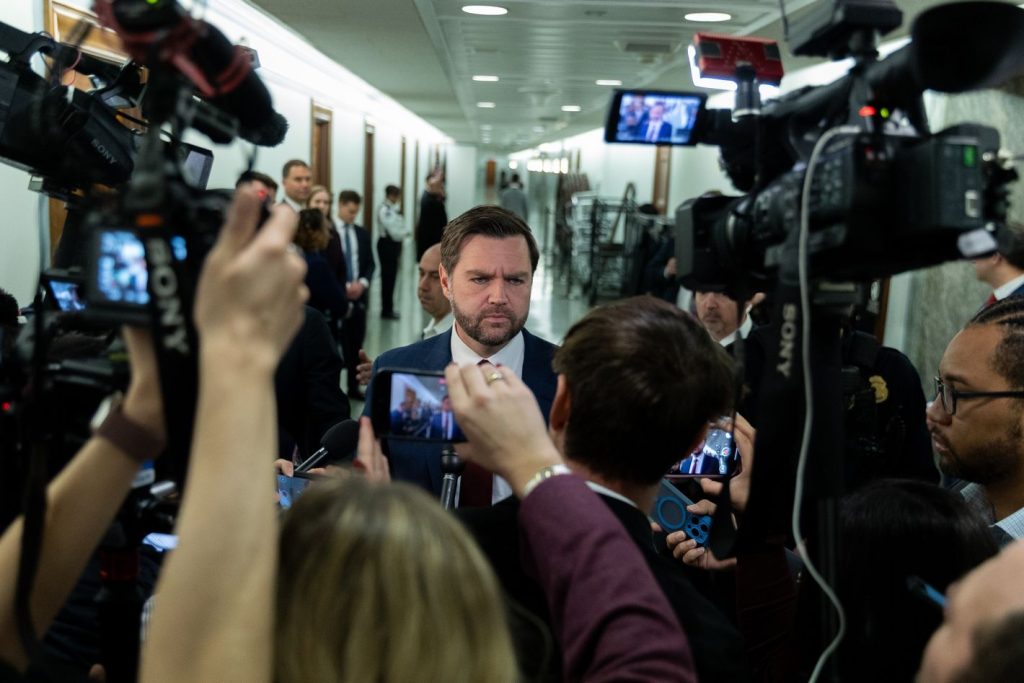Photo: Nathan Posner/Anadolu/Getty Images
As the failed handoff of Democratic Party leadership from Joe Biden to Kamala Harris is being relitigated, it’s worth asking how well Republicans will manage their own transition to a post-Trump era in 2028. It could be a significant problem. Despite the well-documented evidence of Democratic loyalty (misplaced or not) in Joe Biden that enabled him to undertake a reelection campaign many thought inadvisable, no one would argue that Biden even remotely had the sort of grip on his party that Trump patently has over the GOP. It’s hard to imagine a successor who can come close to the 45th and 47th president’s Sun King aura or his persistent ability to dominate political discourse.
In choosing J.D. Vance as his running mate in 2024, Trump may or may not have been consciously naming a successor (he has refused, so far, to make any sort of definitive statement on the matter). But even as Vance settles into the vice-presidential office and takes up the traditional assignments associated with it (loyalist-in-chief, attack dog, and attender of overseas ceremonies), it’s worth asking if he has any real credentials for ascending to the peak of party leadership beyond the backing of his Oval Office patron. After all, Trump’s first VP’s political capital vanished without a trace once the Boss repudiated him. And lest we forget, Mike Pence had built up decades of credible experience in the GOP before joining Trump’s ticket; indeed, at the time it was thought that Trump got more out of the partnership than Pence. Before his selection as vice-president, Vance had a bankable personal narrative and best-selling memoir but less than two years of experience in public office. Will he grow into the role of heir?
One emphatic “no” vote has been cast by The Bulwark’s ever-estimable columnist Jonathan V. Last, who in a hilarious but still quite serious take on the veep compares him to the Honkey Tonk Man, a professional wrestler who was lifted into prominence by the dominant figure in the sport, Hulk Hogan, but eventually could not transcend his manifest limitations as an athlete and as an entertainer:
JD Vance is the Republican party’s Honky Tonk Man.
His base of power isn’t Republican voters, but Republican elites. He’s spent his entire adult life currying favor with more powerful patrons — progressing from Amy Chua, to David Frum, to Peter Thiel, to Tucker Carlson, and finally to Donald Trump’s children. Instead of making himself popular with voters, Vance chose to work the inside game. He targeted people with enough juice to give him the prizes he wanted …
Just like Honky Tonk, Vance has never been able to overcome his intrinsic limitations. He’s smug and inauthentic; self-involved and utterly humorless. As good as he is in a room with VC funders or Claremont groupies, he seems to have no idea how to act around normal human beings …
[W]hatever lip service Vance pays to MAGA populism, he still holds a pre-Trump view of the Republican party as a place where elites have the power to foist leaders on the rubes.
But wait: Isn’t the GOP the disciplined party that usually picks the Next Man Up for its presidential nominee? That used to be the mythology, but aside from the fact that Trump himself twice trounced a whole field of more likely presidential nominees, there’s actually a history of GOP veeps who never made the big leap from the second spot on the ticket to the first.
In the eight decades since the end of World War II, there have been 16 vice-presidents, seven Democrats and nine Republicans. All but one of the Democratic veeps later became presidential nominees. (The only exception, Harry Truman’s 1948 running mate Alben Barkley, was 75 when his term as vice-president ended, which was considered prohibitively old for a presidential run). But on the Republican side, only three veeps have won presidential nominations.
The successful successors didn’t necessarily rise to the top automatically. Richard Nixon had the easiest path to a presidential nomination, but he had two terms to serve as Dwight D. Eisenhower’s understudy and then had to cut a humiliating platform deal to head off a challenge from Nelson Rockefeller. He also arguably had a more distinguished pre-veep career than Vance. Gerald Ford actually became president as the sitting veep when Nixon resigned in 1974 and then had to fight like hell to very narrowly win the 1976 nomination against Ronald Reagan. And then Reagan’s veep, George H.W. Bush, also had to fight like hell to win the 1988 nomination, crucially defeating Bob Dole via some well-timed anti-tax demagoguery and a close alliance with the Christian right.
Could J.D. Vance do as well as George H.W. Bush, Gerald Ford, or Richard Nixon if challenged for the 2028 nomination? It’s right to be skeptical about it at this time. The one thing we can say with little doubt is that Vance as a national party leader would blow away like an Appalachian trailer home in a tornado if Trump withdrew his blessing. So he has even more reason than the average veep to cleave to the president unconditionally. And it should worry Vance that while Trump always demands loyalty, he does not always reward it.

